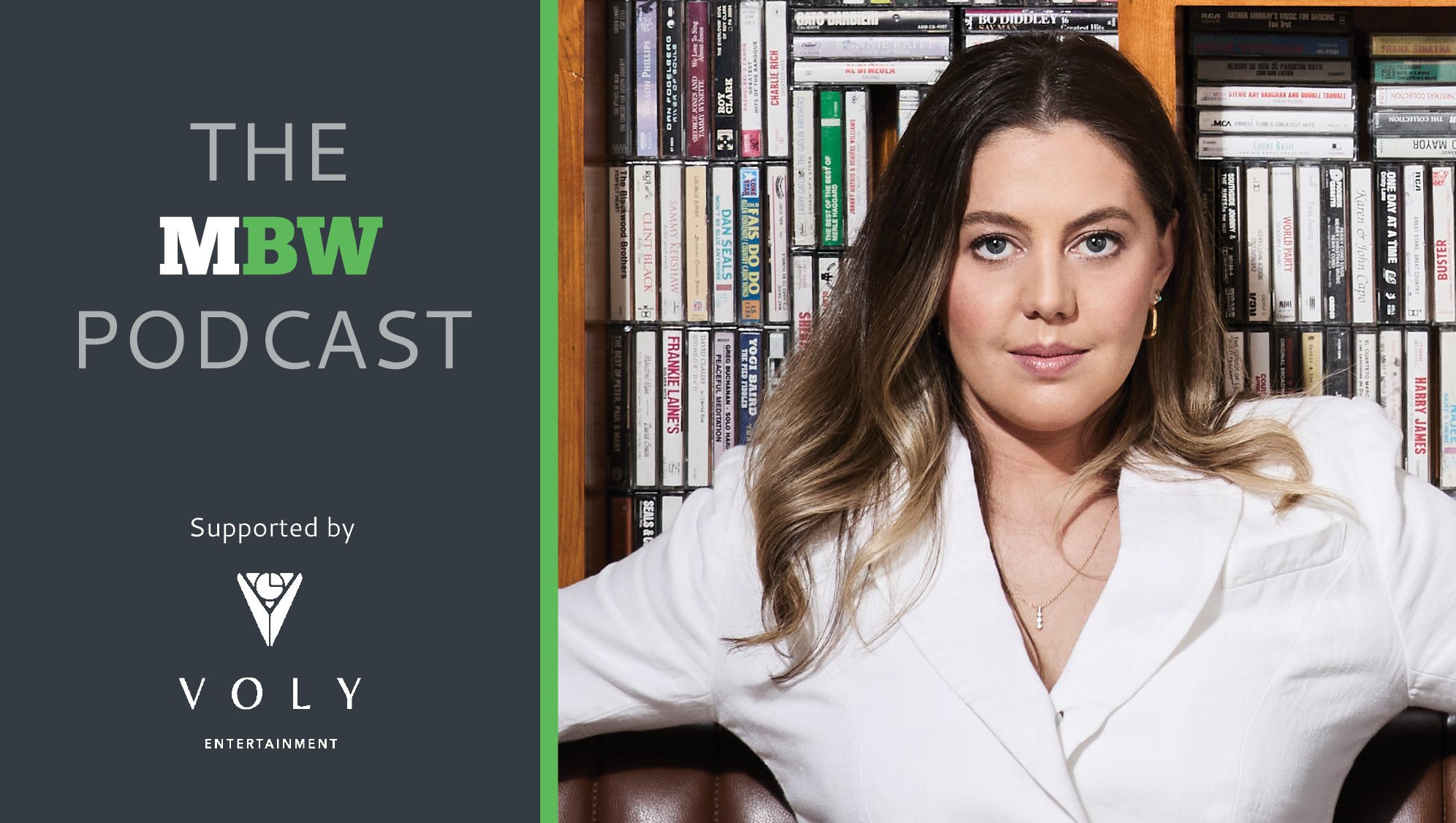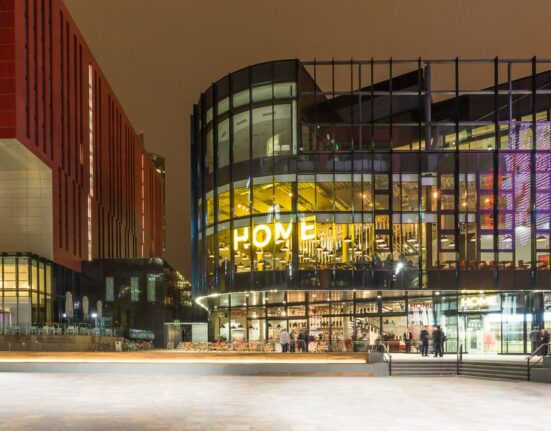On the latest Music Business Worldwide podcast, MBW founder Tim Ingham is joined by Milana Rabkin Lewis, the founder and CEO of Los Angeles-based Stem, a distribution and services company, including financial services for independent artists.
Stem has had a big year, with a major highlight coming last summer when it announced it had secured a $250 million credit agreement with Victory Park Capital, which has transformed the size and scope of artist advances that Stem can offer.
For a company that has grown used to seeing some of its biggest independent artists jump to major label deals, that $250 million raise is something of a game changer for Stem and Milana.
Long-term listeners to MBW’s podcasts may remember that this isn’t Milana’s first time speaking to us. She last appeared on this podcast four years ago, just at the tip of the pandemic, and she volunteered a number of predictions about the music businesses in the years ahead, many of which have already come true, or at least partly come true.
On this podcast, Milana and Tim discuss – with some agreement, but not always – several crucial topics in the music business right now, from TikTok versus Universal Music Group to artist-centric streaming royalties to artificial intelligence, and of course Stem, and why Milana truly believes she is building a music company fit for the future.
Read an abridged/edited version of the Q&A below, or listen to the podcast above…
What are the most interesting things going on with Stem as we speak today?
I think it’s just the consistent day-to-day growth and the type of artists we’re getting to work with.
It’s a little bit of everything, and that’s what makes it exciting for us. A number of years ago, we became more curated as a platform. So when we sign a client at this stage, it’s because someone internally has a point of view. And when you have someone on a team [who’s] incredibly passionate or has a point of view, or is excited about an artist, the way that they move with that artist is entirely different. And that’s what makes it exciting to watch my team engage with artists today. And because of that, we’ve had a number of great successes.
So it’s everything [including] identifying artists that are baby acts [who have] never released music, that we get to put up for the first time and break into the world. We’ve had a lot of successes over the years with artists like that, dating back to the early days of Giveon and Omar Apollo, to more recently artists like Veeze…
A number of them end up signing with the majors and that’s okay, but it’s still exciting to be the home that launches them. Even earlier on, that was people like Bad Bunny. And we were working with Big Loud when they first launched Morgan Wallen. So it’s been fun to see that trajectory.
“When you have someone on a team [who’s] incredibly passionate or has a point of view, or is excited about an artist, the way that they move with that artist is entirely different.”
And then there’s a lot of artists who had been with a major label and decided to become independent, and we get to be part of their strategy in becoming independent.
Recently, we spent a lot of time with a band called LANY. They were previously signed to one of the majors, they’re an indie pop-rock act. And they never found radio success with the major label. Most of the time, the reason why artists want to bring on a major label is because of their access to radio.
Last fall they released last fall an album with us called a beautiful blur. And these guys, they’re not new artists by any means. [They’ve sold out] big rooms in some cities, even arenas, so they’re definitely at a good point in their careers… They have such a rabid fan base. They’d never been on radio until we got XXL trending, and it’s been on all top 40 radio stations across the country… To me, it’s feeling like we’re making impossible things possible. And that’s a mantra that I live by.
There was a major announcement last summer where you reached a deal with Victory Park Capital, and there was a raise a year before that when Block got involved in the business. In light of these investments, how has the company evolved in terms of what it can offer artists?
The Victory Park relationship is a really powerful one that we’re just really, truly getting started with. Their primary business is providing capital to businesses that have a unique model, where they lend against alternative assets. Music in the finance world is looked at as an alternative asset class that’s uncorrelated to the economy, which means that if the economy isn’t performing – which in the last year, it had not been, we’re not in the best economic state, as a world, not just the country; the stock markets have plummeted in many ways – and yet music still performs really well. It’s uncorrelated to the economy, and people like that. And it’s also a really interesting annuity in that it kicks off cash flows relatively in perpetuity.
And so for us, our biggest challenge – in order for us to keep growing the artists that we launched, or invest in the artists that we’re bringing on, that are coming off a major label – is the ability for us to fund them. With Victory Park [we’re able] to extend larger check sizes, [offer] slightly more patient capital, and [we’re also] able to release against future advances, which is something that not many other people, other than major labels or businesses with their own balance sheet, are able to do.
“I don’t know if anyone actually values being independent. I know that’s pretty crazy for someone like me to say, and the reason I say that is because I think there’s a big difference between independence and autonomy.”
There’s another thing we actually did in the last year. We launched a new brand called Tone, and it really is its own business unit within Stem, with its own dedicated team, its own engineering team, product operations, sales, marketing, etc. And Tone is all of the software that we built initially for Stem – to do the split payment, the recruitment, the visualizations of the data – and built in a way that other labels that we do not distribute can use.
So a label [can use Tone] to do their royalty calculations, in the same way that they would hire an accountant or an outside firm to do. We can do it full-service, but what they really get, as well, is this technically elegant dashboard experience, and not only managing the whole workflow around royalties – [it’s] everything from expenses to contract management, all the way through [to] setting up the payments in an automated way, providing the data and reporting in the dashboard, not just to the label that’s doing the accounting but more importantly to everyone who’s getting paid.
And we’re going to continue to extend and evolve various feature sets that we’re really excited about.
And our relationship with Block and the way that’s connected is really learning from their business. Jesse Dorogusker – who’s now leading TIDAL under Block, and he was running product for all of Block prior to that – is on our board as an observer, and he’s part of a lot of the conversations. We’re learning from [what] Block [did] when it was launching its first product, Square, and how it’s evolved since then, and vice versa. I think they’re learning a lot about the music industry from us as well. So it’s a pretty symbiotic relationship at this point.
When the majors come in to sign your artists, are you seeing any changes to the deals they’re offering? Are they offering less money? And behind the scenes, are you noticing the deal terms change? You look at deals like Taylor Swift’s, we don’t know the full details but it certainly looks like there’s some sort of distribution services element to it, and certainly a high margin for the artist. And are artists still mostly choosing to go with the majors?
I’ll say this. I don’t know if anyone actually values being independent. I know that’s pretty crazy for someone like me to say, and the reason I say that is because I think there’s a big difference between independence and autonomy. And I think people conflate the two.
I think when artists say they want to be independent, what they really mean is they want to be autonomous, and at different stages of their careers, the value in that is going to change. I think if you’re an emerging artist – there’s very few of them who actually truly want to do it independently, because what they really want is access to capital investment, and a team that really cares about them, to be able to get them off the ground. And I think they’re willing to trade ownership [to] a certain extent in order to get that.
“I think when artists say they want to be independent, what they really mean is they want to be autonomous, and at different stages of their careers, the value in that is going to change.”
Now what I think is changing is they’re not willing to sign everything away forever. And I think that the major labels are realizing that and adapting as well, but [artists are] willing to sign the first few projects that they come up with. And they’re willing to give the rights away to those projects for a very long time as well, because it warrants a bigger advance and it warrants a bigger investment.
What we’re seeing is the market’s moving pretty aggressively. When we started Stem, a lot of the major labels were not making huge investments in artists. I think that’s what really sparked a lot of growth in the independent sector. They were doing [small] deals because that was coming out of a pretty terrible market for the music industry and that streaming hadn’t fully become globalized. There wasn’t as much recorded revenue coming in.
Just as an example, [when] we started the raise for the Victory Park fund, what we saw on the market was a lot of major labels were underwriting deals, even for new artists to pay back in [let’s say] five to eight years and maybe 10. And what we’re seeing now is they’re underwriting deals to pay back in 15, maybe even 20.
So what does that mean for a company like Stem and the opportunities that lie in front of you?
It means we have to be more aggressive. We have to be able to underwrite our capabilities or accept the fact that those types of artists who are just shopping for the largest check size and not the right fit for us. That’s okay. The good news is that there’s enough out there.
I think what’s interesting now is that the major labels are also becoming more diversified in the type of deals that they’re structuring. And I think it’s conflating what people’s perception of the independent market is. It’s really hard to size it, because there’s a lot of these bigger players that are providing market share to the major record label companies, and they’re taking very low fees for being able to retain those clients, and attract them, and they’re making that trade because they know that maybe they’re trading near-term revenue for long term enterprise value. I think it’s a very smart trade and it makes a lot of sense.
What is independence in the music business, anyway? Is it owning your copyrights? Is it owning them for now? Or getting them back in two years, three years, five years? And what does it mean versus autonomy? As you said, it’s virtually impossible to size the independent music market, because the only thing anyone is able to define is a major label. But actually, we don’t know what’s in those deals.
And also, they don’t really have independence either. Meaning [acts like Bad Bunny, for example] signed to the independent distribution arm [of a major record company]. Yes, they own their catalog. They’re not selling their catalog per se, but they can’t make decisions the way that most independent artists [can]. Even using the recent example of Universal and TikTok. Their music got taken down. It’s not their choice. Someone else made that decision for them.
Since you brought it up, what are your thoughts on the dispute between Universal and TikTok?
Does TikTok care? I have no insight into the underpinnings of the conversation, where they stand, but if I were TikTok, I wouldn’t give a s***. I just wouldn’t.
Well, there are some stats that show that user engagement is down. How much of that can be attributed to Universal’s catalog moving off the platform, I don’t know. I think TikTok’s probably feeling more heat from rival services like Reels and YouTube Shorts, now that Universal is able to give them an advantage. I think eventually this becomes a frustration for TikTok users, and I think that shows up in user engagement numbers.
Possibly, but a lot of that music is finding its way back on TikTok. A lot of those labels and managers have called us, and probably a lot of other distributors, to say, ‘Can you release my music on TikTok for me? I’m taking it down from Universal.’ If they have the option to do that. And some of them are just bypassing it entirely and saying ‘We’ll ask for forgiveness, not permission.’
And another case – Scooter [Braun, CEO of HYBE America] announced that they’re doing a direct deal with TikTok. Even though they just negotiated their deal with Universal, they’re going direct to TikTok.
“A lot of that music is finding its way back on TikTok. A lot of those labels and managers have called us, and probably a lot of other distributors, to say, ‘Can you release my music on TikTok for me? I’m taking it down from Universal.’”
So my point is TikTok knows it’s going to happen. Yes, it’s gonna put pressure on them that Reels is going to get the content, sure. But what I can’t get over is: Hasn’t the music business learned its lesson yet?
One of my favorite books to recommend to people about the music industry is Steve Knopper’s Appetite for Self-Destruction. It talks about how with every new format, the music business tries to resist it [and] ends up shooting itself in the face, and then being the loser in the whole situation, and losing out on something, and eventually opting in and figuring out how to work with it.
I’m not sure I 100% agree with you, but let’s talk about the artist-centric royalty payment model that we’ve seen Deezer and Spotify implement recently. My guess is that this model is probably a net positive for Stem, because you do have big artists you work with, professional or professionally aspiring artists, as Spotify calls them. But at the same time, there’s this debate over the kind of arguably arbitrary categorization of an artist not being worthy of monetization, or not being worthy of being on a platform. What’s your perspective on this?
I just had a two-hour conversation about this with an artist of ours who had become friends with [DJ and producer] Justin Blau, who’s also a tech founder, and I want to give you his perspective.
But before I share what we talked about, I think [artist-centric] is net positive. The reason why we chose to be curated is because we realized that everyone else is delivering a s***-ton of content every single week and [you want to] advocate for your artists.
I have so many friends who are editors. They come to my house, and sometimes we’ll work together and I’ll watch how they edit and it’s crazy to me – there’s a dashboard and they’re looking through all of the releases and they’re organized alphabetically. So if you’re an artist with a name that’s [further down the list] they’re never getting to your name.
“There’s a cost to maintaining that amount of music, to managing it, to curating it, to having to invent ways to be able to surface editorially appropriate music… And that’s expensive. That takes up a lot of the cost on the side of the DSPs to manage that… if you clean that up, there’s better economics for everyone.”
It’s wildly inefficient because of how much volume there is. Versus when we deliver stuff at Stem and they look at what we’ve delivered. It’s a short list, so when we deliver something, it stands out. And I think [what] we’re going to start seeing is [that] there’s going to be different types of – call it “music storefronts” that are going to emerge, that are going to be homes for more sounds, and – call it “longer-tail content.” And I think what would be great is if the Apples and the Spotifys and the Deezers and TIDALs of the world were reserved for more human artists.
Then the question becomes about AI music, which I don’t want to go too far into, because I don’t have that much of a formed opinion around it. But it does bring the question which Justin [Blau] asked me, which is ‘Why should music be valued? Why should music be worth anything? Why should people pay for music?’
And my instant reaction to that was ‘Of course they have to pay for it. It’s valuable. There’s cultural value to it.’ And he’s like, ‘But why is it worth paying someone’s time? Is it only worth something because someone’s spent time doing it? So what happens if you diminish that time to zero?’
I would say that you’re paying for the mental and emotional benefits, you’re paying for the clarity that music can bring to you, you’re paying to be moved. Or if it does something more pedestrian, like shuts out noise and helps you focus, then there is definitely a value in that. I guess you end up with the argument that not all music is valued the same, and you have to try and make the value difference. And base popularity is not a terrible place to start, I guess. There is the argument that music that doesn’t have a clear apparent value doesn’t deserve to take up space from music that does.
There’s a cost to it. There’s a cost to maintaining that amount of music, to managing it, to curating it, to having to invent ways to be able to surface editorially appropriate music… And that’s expensive. That takes up a lot of the cost on the side of the DSPs to manage that, which takes things out of the profit margin, which is ultimately one of the reasons why they need to be able to take a higher cut of the songs that are on that platform. That’s the cost of providing the platform, and I think that if you clean that up, there’s better economics for everyone.
So I’m very much in favor of the artist-centric model. I’m very much in favor of separating different types of music and assigning a different value for the type of music depending on what its value is.
“There’s a theory out there among the tech community… which is that in the future, people will not care to listen to music from people they do not know. It’ll become hyperlocal again.”
I had one of the most insane conversations with a 10-year-old, that terrified me. My nephew’s 10, he’s an aspiring musician. He is a cute little redhead who’s in the school rock band, who looks like a mini Ed Sheeran. He’s been practicing his craft and he performs now with the band, which is like the cutest thing in the world.
But I had this conversation with him where I invited him to Coachella a year ago and he’s like, ‘I don’t really want to go.’ And I was like, ‘Why?’ and he says ‘I don’t really want to see bands perform.’ So I left it at that. I just thought he was moody.
And then a couple months later I invited him to a very special show that Ed Sheeran and John Mayer did together, and I was like, ‘You gotta go see John. These guys are like the best living guitarists today.’ And he’s like, ‘I don’t care. I don’t want to see the artists perform their music. I want to perform the music the way that I believe it should be performed.’
And there’s a theory out there among the tech community, too, that I’ve heard, which is that in the future, people will not care to listen to music from people they do not know. It’ll become hyperlocal again.
I’m not sure I buy it. Spotify recently pinched an analogy of mine, which is about football players. There are millions of people who play football, but only a tiny fraction of them are even borderline professional level, and then of course an even smaller share are the Messis and Ronaldos of the world. Of course, as a kid, you want to participate in football, but eventually, you’re going to go to a stadium to see the best of the best. And even being in the audience, you are participating. Being part of the crowd, watching the best of the best, that is participation. And you don’t fold your arms and say ‘I’m not interested unless I get to run out and play with them.’ I don’t think that’s just a generational difference. I feel like that’s a realization that’s going to have to arrive, eventually. I just don’t believe that the ability to create your own music at home negates people standing in a stadium or an arena watching Adele with their hearts racing.
I hope you’re right. That would be devastating to me, that version of the future. And I have to check my reaction when I hear things like this. Do you know who Joshua Harris is?
I do not, educate me.
Joshua Harris was a very early tech entrepreneur in the early 90s, who created the first company that live-streamed video on the internet. And he pretty much predicted the influencer culture today, back in the 90s. He created these mini societies where you could opt-in to live in this society and everything was free, but the only exchange was that you gave up your privacy. Everything you did, all day, every day, in every room, whether it’s going to the bathroom or sleeping with your partner at night, was documented in live-stream.
I had a conversation with him in 2011, and he said to me ‘In the future kids are going to broadcast themselves brushing their teeth and it’ll be sponsored by Colgate. And people are going to be watching other people pick out outfits, get dressed and they will be paid for that. And the clothes will be free… And it’s going to take away people’s attention spans from wanting to see television and pay for movies and go to theaters and people are going to become more isolated and disconnected from each other.’ And I was like, ‘You’re crazy. That’s never gonna happen.’
At the end of his prediction, did he say ‘And then the Horsemen will come and then the skies will go black’? I mean, it’s scary when you put it like that. But I have to maintain a belief that the emotional power of music will prevail. But we’ll see.
I pray you’re right and I hope you’re right. But… if you’re building for the future of something, which is what I think my job is – to build for the future – [then] I have to continually ask myself, ‘But what if this is true? What needs to happen in order for that to be true? And what are the things that I could personally do to preserve the integrity of the industry that I value?’








